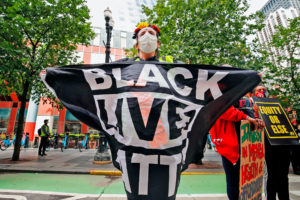Is this it? Could this, finally, be the end of the Islamic Republic of Iran? As huge crowds of women and men surge through the Iranian streets, burning hijabs and calling for “Death to Khamenei!”, is an impossible dream finally about to come true?
The prospects certainly look better than in 2009, when the country’s protestors were primarily middle-class and more narrowly focused on the issue of Ahmadinejad’s election victory, rather than on dismantling the oppressive system in its entirety. Today, men and women, rural and urban, affluent and poor are all marching to bring down the Islamic Republic. Khamenei is also reported to be in very poor health, so the chants might just come true.
Yet senior US officials I have spoken to have cautioned against blind optimism. As they explained, we’ve seen many moments in recent Iranian history where the tide seemed about to turn, only to be disappointed. The same officials also warned that America is trying not to become too involved: the Biden administration isn’t supporting the protestors, but it isn’t explicitly discouraging them, either.
This isn’t an example of craven politics: I also fear that the end of the regime might not herald a brave new world, but rather a bloody mess, where Khamenei’s death is followed by internecine fighting for power between various Iranian factions. Would the overthrow of the regime lead to civil war, a military coup, or liberal democracy? Nobody knows.
None of this is to say that, faced with a possible uprising in Iran, America should avert its gaze. Perhaps more than anything, the wave of protests now sweeping the country is a perfect moment to remind ourselves of the shameful stupidity of US policy in the region in recent years. Take the 2015 JCPOA nuclear deal, which gave the regime time and space and money to strengthen its morality police and security infrastructure, as well as extend its regional influence. If no deal had been signed, perhaps the regime’s current crisis would have come sooner.
Nor should we forget the fact that Iran has recently tried to abduct and kill several American citizens on American soil; or that a number of senior US officials believe Iran is to blame for the attempted assassination of Salman Rushdie last month. It’s a national disgrace that America’s politicians saw fit to break bread with the butchers of Tehran in the first place. And still too many think we can politely sit down with them again to re-negotiate the nuclear deal. I wouldn’t blame the brave men and women of Iran if they never forgave us for such short-sighted idiocy.
Still, while the response of the West should be limited to cautious optimism, there is one other conclusion we can draw, no matter what happens: the current protests are a unique, and uniquely inspiring, phenomenon. Nowhere else in the Muslim world — and I mean, literally, nowhere else — would we see what we are seeing right now in Iran: men and women, together, standing up for each other, the men demanding justice for the regime’s murder of a woman who dared to let her hair show. It bears repeating: the men of Iran are standing alongside women as they burn their hijabs.
This is the most dramatic evidence of something I have long suspected: Iran is different. I have many Iranian women friends who are highly accomplished. They are doctors and scientists and writers and artists. When I ask them how they do it, they tell me that they owe much of their success to their male relatives’ support of their ambitions. So perhaps we shouldn’t be surprised that the fire behind the protests was lit by Mahsa Amini’s family — in particular, her father, whose remarkable courage in accusing the Iranian authorities of a cover-up serves as an emblem of the solidarity many Iranian men have with their women.
Now, there are caveats to this. This phenomenon isn’t universal across Iran, and many Iranian women suffer terribly at the hands of their families (and some women are even vicious policers of “morality”). But the fact that even some men behave like this is distinctive in the Muslim world, and their appearence alongside women in these protests is not a sight that will soon be forgotten. In other Muslim countries, women suffer as much, if not more, at the hands of their male relatives as at the hands of the authorities. Men jealously guard women’s honour, beating, imprisoning, and even killing their female family members for bringing shame upon the family.
This is part of the reason why Iran is so unique: not only are men standing publicly with women, but women must also be aware that they are under no threat from their husbands and male relatives, otherwise they would not dare put themselves on the front lines like this. Consider, for example, the beautiful, inspiring videos of women tossing their headscarves into bonfires before dancing joyously away, for all the world to see. If they thought their fathers or brothers were waiting back home to punish them, I doubt we would see such sights on this scale.
Meanwhile, in the West, where feminism has proved more successful than anywhere else, anti-male grievance dominates the mainstream, with solidarity between men and women replaced by a desire for polarising identity politics. As America’s feminist movement collapses under the weight of it its own divisiveness, I can’t help but find its Iranian counterpart far more inspiring: men and women standing together, speaking up for each other’s rights. How much better this is than the violently woman-hating Taliban or the petulant privilege of so many Western feminists.
In March 1979, just as the Ayatollah Khomeini came to power, the American feminist Kate Millett travelled to Iran to join a protest against his plan to make hijabs compulsory for women. The demonstration ultimately proved unsuccessful. Millett was arrested and expelled from the country; Iranian women were turned into second-class citizens. Yet, as we are now discovering, their revolutionary spirit was not extinguished. Iranian feminism has stood the test of time; it hasn’t been corrupted. If only the same could be said for the West.
Disclaimer
Some of the posts we share are controversial and we do not necessarily agree with them in the whole extend. Sometimes we agree with the content or part of it but we do not agree with the narration or language. Nevertheless we find them somehow interesting, valuable and/or informative or we share them, because we strongly believe in freedom of speech, free press and journalism. We strongly encourage you to have a critical approach to all the content, do your own research and analysis to build your own opinion.
We would be glad to have your feedback.
Source: UnHerd Read the original article here: https://unherd.com/



